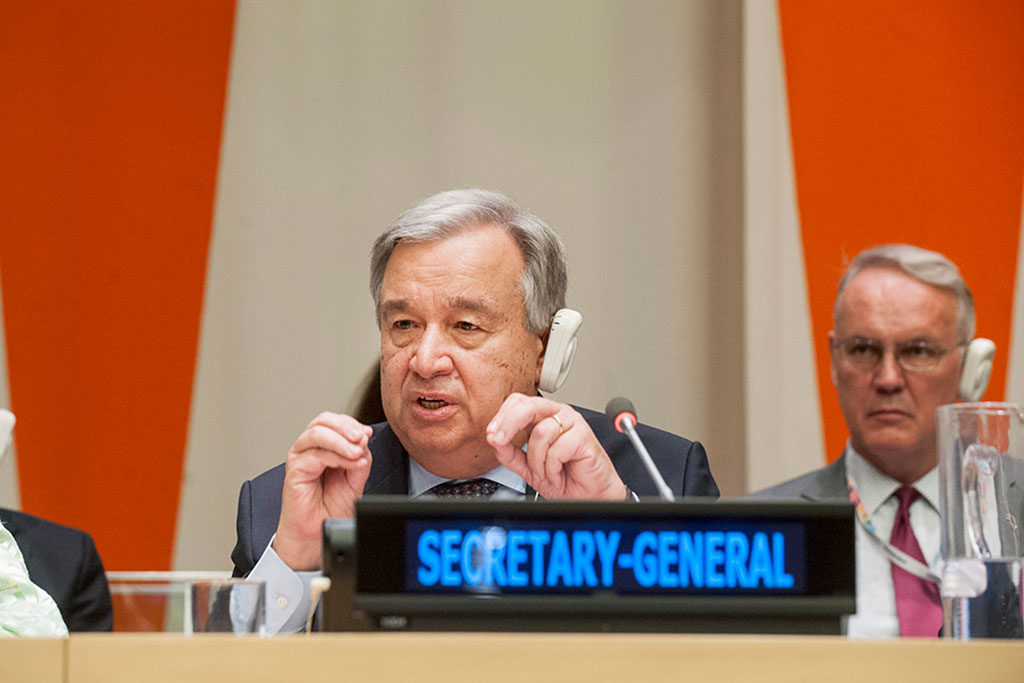In a joint remote briefing to member states on Friday, March 27, 2020, top officials of the United Nations solicited global assistance for poor countries to mitigate the socio-economic impact of the coronavirus pandemic.

The briefing was led by the UN Secretary-General Antonio Guterres, who was joined by three other senior officials of the organisation from different locations via video links.
They are President of the General Assembly (PGA), Amb. Tijani Muhammad-Bande; President of the Security Council, Amb. Zhang Jun; and President of the Economic and Social Council, Ms Mona Juul.
Guterres reiterated his call for action against the pandemic in three critical areas namely containment, mitigation of its economic impact and inclusive recovery efforts.
“We must come to the aid of the ultra-vulnerable – millions upon millions of people who are least able to protect themselves.
“We need to suppress the transmission of COVID-19 in a coordinated way as quickly as possible. That must be our common strategy.
“And that implies we need massive support to increase the response capacity of developing countries and those in the most fragile contexts,’’ he said.
The UN chief noted that the COVID-19 pandemic was a human crisis, and not a financial one, hence the need for all efforts at protecting the financial systems to have a human face.
“We need to concentrate on people, keeping households afloat and businesses solvent, able to pay their workers.
“This will require a package reaching double-digit percentages of global Gross Domestic Product.
“This includes a global stimulus package to help developing countries that requires a massive investment by the international community,’’ he said.
To this end, Guterres said he had reached out to the International Monetary Fund, the World Bank and other international financial institutions.
The secretary general also appealed for the waiving of sanctions that could undermine the capacities of countries to respond to the pandemic.
“We must set the stage for recovery that builds a more sustainable, inclusive and equitable economy, guided by our shared promise — the 2030 Agenda for Sustainable Development.
“All our efforts need to be underpinned by a strong commitment to have respect for all human rights for everyone, without stigma.
“Recovery must address the inequalities, including gender inequalities, that are leaving so many more people vulnerable to social and economic shocks,’’ he added.
In his opening statement, the PGA said the pandemic was a “reminder that humanity is only as safe as its most vulnerable groups’’.
Muhammad-Bande, who is Nigeria’s ambassador to the UN, noted that the social and economic consequences of the COVID-19 crisis were threatening to plunge people deeper into poverty.
“We need to galvanise multilateral action now to protect gains made towards the eradication of poverty and zero hunger, as this crisis puts a strain on food production and supply chains among others.
“We must also implement a targeted response to safeguard the future of this generation that is experiencing disruption in their education.
“Schools have closed in over 130 Member States, with many lacking the connectivity required to continue education through ICT-based distance learning.
“In this 75th year of the United Nations, the peoples we serve are relying on us, perhaps now more than ever.
“Let us strive together to overcome the latest challenge to humanity. I am certain we can do so,’’ he said.
The ECOSOC president, Juul, said the impact of the COVID-19 “strikes at the heart of what the UN stands for: our values, ideals and norms’’.
She noted that the world was witnessing an unprecedented emergency that required the cooperation and solidarity of all nations to surmount.
“In times of crises there is a tendency to turn inwards and focus on our own countries, communities and homes.
“But as we have seen this pandemic requires decisive and urgent collective action from the global community and from each and every one of us,’’ she said.
For his part, the Security Council president, Juul, said although the pandemic had affected some activities of the council, its work plan had been adjusted to cope with the situation.
He assured member states that the council was working relentlessly to deliver on its mandate of ensuring world peace and security.
The briefing focused on how the UN principal organs are remotely connecting with Member States and other stakeholders following the cancellation of physical meetings due to the pandemic.
Measures were being taken to mitigate the impact of the virus on the work of the organisation, in addition to the UN’s response to the crisis around the world.
By Harrison Arubu
